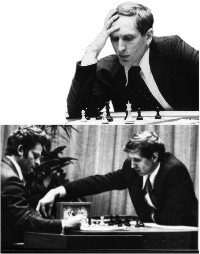Feature
Bobby Fischer's death
The “chess wolf” resigns!
 |
Fischer(right) with Spassky in the Match of the Century, 1972 |
He “skinny kid” who appeared on the American chess scene in the early 1950's was a fiercely attacking player, never happy with anything less than a smashing victory! The top order of the American chess hierarchy was crumbling before him without much of a fight! Remember the game against Donald Byrne in the 1956 US championship? That a 13-year old could play a game like this was indeed incredible. The boy had loftier goals in his mind, though. He was there to scale much greater heights. Those were the days when the Soviets reigned supreme in world chess. Bobby Fischer wanted to dethrone the Russian world champion! All he was equipped with for this mission-almost-impossible was a chess mind full of vigour and energy. The Russians, on the other hand, had some potent weapons in their armorya team of highly committed analysts, trainers and a scientific approach to the game. They developed chess into its modern form since the days of the Bolsheviks (Lenin himself was a chess enthusiast and so was Maxim Gorky) So, they were not ready to concede defeat to an arrogant, bloodthirsty American “chess wolf”. The Russians accepted the challenge in all seriousness. Following their typical modus operandi, they started analysing Fischer's games, only to discover many wonderful aspects of his chess mind, the foremost being his indomitable killer instinct. Fischer was never scared of complications and was ready to defend difficult positions, if that meant victory in the long run.
The Russians worked hard to find out Fischer's weaknesses. Grandmasters were assigned specific jobs to gather as much information about Fischer as possible. Perhaps, they learnt more about Fischer than he knew about himself! But one thing became pretty clear: it wasn't easy to counter him over the board.
Finally, it fell upon Grandmaster Boris Spassky to defend the world title on behalf of the Soviet chess administration in 1972. Spassky, known to be a sporting gentleman, could not absorb the tremendous psychological pressure of having to win at any cost. The Russians were simply not ready to lose! But Fischer in 1972 was invincible. He had won 19 games in a row against the world's very best on his way to the title match! That was in itself cause for concern! Spassky lost without putting up much of a resistance. Fischer's dream came true!
Regrettably, Fischer didn't play any more chess after winning the world title. The match against Karpov in 1975 would have been an interesting one, but FIDE didn't accept Fischer's suggestion that the first player to win six games be declared new champion. Fischer refused to defend his title and that ended the chess career of the great master, perhaps the greatest ever.
Fischer' universal style of play had a huge impact on chess. Chess was enlivened to a great extent by his ideas, and of course by the controversies that invariably arose when Fischer was around! His critics always tried to portray him as highly self-centred man who could see nothing beyond his own interests. But can they really deny that it was Fischer who popularised chess all over the world? The game of chess owes a lot to this erratic yet brilliant fellow.
-Patzer
|
